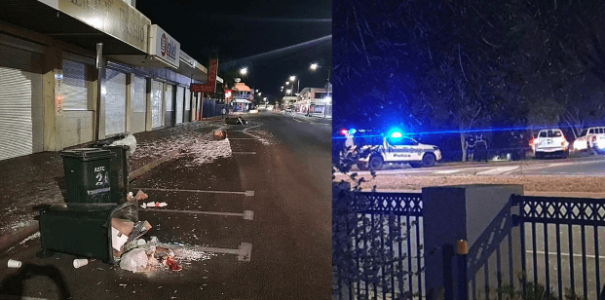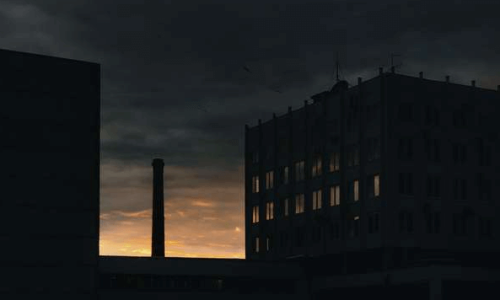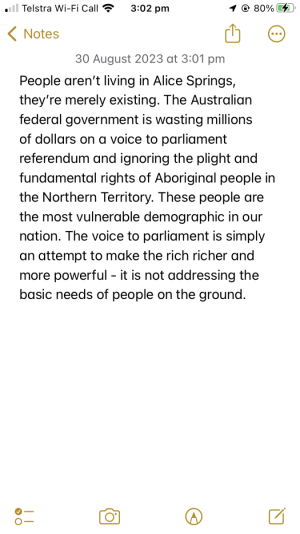Choosing between rent and food: The disturbing reality of the cost-of-living crisis in remote parts of the country
- Replies 25
It's a harsh reality most have faced in recent years: Life in some places in Australia is incredibly tough.
With the current cost of living crisis being particularly dire, heart-breaking stories of theft and desperate measures—such as intentionally living in the dark—are coming to light from remote parts of the country.
Take, for example, the 'absolute poverty' of life in parts of Alice Springs.
According to Liza Balmer, the CEO of the NPY Women's Council—an Indigenous organisation offering financial and social support—her organisation assists around 80 people each week. Sadly, they are forced to turn away an additional 120 people in need.
'People are self-selecting power outages... There are some going without food some days,' she said.
'Our region probably sits in the lowest 10 per cent of the income scale in the country and is highly reliant on income support.'
She said the staff are also increasingly aware of people lashing out after being turned away due to the lack of funds.
These individuals are also said to be being let down by their own families. Balmer shared that stories are circulating about 'young people' turning on their own families after being denied help.
'[There are] young people stealing their grandparents' money,' she said, with some community seniors reportedly left with no choice but to 'run to the bank to get their money out before their kids do'.
Reports indicate that many of these young individuals could be eligible for Centrelink support, yet they have never been provided with the necessary resources to initiate the application process.
The inability to meet their basic needs drives people to extraordinary measures to survive.
When asked how dire this situation is, she said: 'People are choosing: do we pay the rent this week, do we eat this week, who goes without? That's real conversations that are being had.'
With the double challenge of punitive rent levels and the increasingly unaffordable cost of necessities, Balmer pointed out that many of those living in poverty are resorting to high-interest payday loans to pay for groceries and manage their budgets.
Unfortunately, this isn't an effective solution to the problem. After using such loans to pay for one meal, they are compelled to take out another loan to repay the first, leading them into an endless cycle of debt.
'They are living in poverty, there's no doubt about that,' she said.
Alice Springs Mayor Matt Paterson has also spoken out about the dire state of things in his region, echoing Balmer's statements.
He said that the dollar doesn't go as far as it should in Central Australia and that the cost of building anything in the area, including homes and infrastructure, is much higher due to a certain 'Alice Springs tax' that is unofficially in place at all times.
The lack of available funds is leaving its mark on education systems as well. The Principal of Yipirinya School, Dr Galvin John Morris, told an inquiry about how hard it is becoming to properly educate disadvantaged children, particularly in terms of providing proper support and meeting the funding demands from the government.
The school initially anticipated an $8 million request for a boarding school project. Still, Dr Morris believes that even if the government approves it, it won't cover the costs anymore, as the project has since risen to $12.1 million.
The lack of funds is also preventing people from receiving necessary medical treatment.
In one case, as mentioned by Fred Docking, the Northern Territory coordinator for the Salvation Army, a mother with cancer refused to go for treatment in Adelaide because she couldn't afford the costs of bringing her children along.
Regarding the issue of providing people with food, Docking also mentioned that a single $50 voucher is no longer sufficient for families, given the continuously rising prices of groceries.
'We do have to mandatory report on occasion, but parents really love their children, and they're doing the best they can,' Mr Docking said.
'It's just tough.'

Paterson further noted that rates of crimes such as break-ins and theft have been increasing for the past two years.
They cannot maintain these rates as low as they would like due to the escalating insurance costs. This situation has led the council to install robust light-blocking metal barriers on the windows of some of their buildings.
Regrettably, these measures haven't alleviated the rising sense of insecurity that is spreading in the area. People are becoming increasingly hesitant to go out for dinner, let alone venture beyond Alice Springs.
'They fear for their safety,' the mayor explained.
These challenging circumstances have been exacerbated by the reduced number of flights operating in the area. This has made it difficult for residents to take trips to other parts of Australia and return home promptly.
'We have people missing loved ones' funerals because they simply cannot afford to get into or out of Alice Springs,' said Paterson.

Truly, the cost of living crisis has been affecting many people now, and Australians in rural parts of the country are experiencing even more significant challenges. What are your thoughts on this recent news? Feel free to leave a comment below.
Members, while we value free speech, we also understand that this is a topic that may evoke strong reactions for some. Please remain respectful towards each other and the people involved in your discussions.
With the current cost of living crisis being particularly dire, heart-breaking stories of theft and desperate measures—such as intentionally living in the dark—are coming to light from remote parts of the country.
Take, for example, the 'absolute poverty' of life in parts of Alice Springs.
According to Liza Balmer, the CEO of the NPY Women's Council—an Indigenous organisation offering financial and social support—her organisation assists around 80 people each week. Sadly, they are forced to turn away an additional 120 people in need.
'People are self-selecting power outages... There are some going without food some days,' she said.
'Our region probably sits in the lowest 10 per cent of the income scale in the country and is highly reliant on income support.'
She said the staff are also increasingly aware of people lashing out after being turned away due to the lack of funds.
These individuals are also said to be being let down by their own families. Balmer shared that stories are circulating about 'young people' turning on their own families after being denied help.
'[There are] young people stealing their grandparents' money,' she said, with some community seniors reportedly left with no choice but to 'run to the bank to get their money out before their kids do'.
Reports indicate that many of these young individuals could be eligible for Centrelink support, yet they have never been provided with the necessary resources to initiate the application process.
The inability to meet their basic needs drives people to extraordinary measures to survive.
When asked how dire this situation is, she said: 'People are choosing: do we pay the rent this week, do we eat this week, who goes without? That's real conversations that are being had.'
With the double challenge of punitive rent levels and the increasingly unaffordable cost of necessities, Balmer pointed out that many of those living in poverty are resorting to high-interest payday loans to pay for groceries and manage their budgets.
Unfortunately, this isn't an effective solution to the problem. After using such loans to pay for one meal, they are compelled to take out another loan to repay the first, leading them into an endless cycle of debt.
'They are living in poverty, there's no doubt about that,' she said.
Alice Springs Mayor Matt Paterson has also spoken out about the dire state of things in his region, echoing Balmer's statements.
He said that the dollar doesn't go as far as it should in Central Australia and that the cost of building anything in the area, including homes and infrastructure, is much higher due to a certain 'Alice Springs tax' that is unofficially in place at all times.
The lack of available funds is leaving its mark on education systems as well. The Principal of Yipirinya School, Dr Galvin John Morris, told an inquiry about how hard it is becoming to properly educate disadvantaged children, particularly in terms of providing proper support and meeting the funding demands from the government.
The school initially anticipated an $8 million request for a boarding school project. Still, Dr Morris believes that even if the government approves it, it won't cover the costs anymore, as the project has since risen to $12.1 million.
The lack of funds is also preventing people from receiving necessary medical treatment.
In one case, as mentioned by Fred Docking, the Northern Territory coordinator for the Salvation Army, a mother with cancer refused to go for treatment in Adelaide because she couldn't afford the costs of bringing her children along.
Regarding the issue of providing people with food, Docking also mentioned that a single $50 voucher is no longer sufficient for families, given the continuously rising prices of groceries.
'We do have to mandatory report on occasion, but parents really love their children, and they're doing the best they can,' Mr Docking said.
'It's just tough.'

Alice Springs is considered 'unlivable' for many people, especially young families, partly due to increased crime rates. Credit: Facebook/Action for Alice 2020.
Paterson further noted that rates of crimes such as break-ins and theft have been increasing for the past two years.
They cannot maintain these rates as low as they would like due to the escalating insurance costs. This situation has led the council to install robust light-blocking metal barriers on the windows of some of their buildings.
Regrettably, these measures haven't alleviated the rising sense of insecurity that is spreading in the area. People are becoming increasingly hesitant to go out for dinner, let alone venture beyond Alice Springs.
'They fear for their safety,' the mayor explained.
These challenging circumstances have been exacerbated by the reduced number of flights operating in the area. This has made it difficult for residents to take trips to other parts of Australia and return home promptly.
'We have people missing loved ones' funerals because they simply cannot afford to get into or out of Alice Springs,' said Paterson.
Key Takeaways
- The cost of living crisis in Alice Springs is severe, with families having to make choices between paying rent and eating and instances of kids stealing from their grandparents.
- The NPY Women's Council, an Indigenous organisation offering financial and social support, is struggling to manage the demand, with limited funding forcing them to turn away people in need.
- The crisis also affects education, with the cost of implementing necessary programs at Yipirinya School escalating due to delays in receiving approved funding.
- Other community issues include limited flights and skyrocketing insurance rates due to rising crime cases.
Truly, the cost of living crisis has been affecting many people now, and Australians in rural parts of the country are experiencing even more significant challenges. What are your thoughts on this recent news? Feel free to leave a comment below.
Members, while we value free speech, we also understand that this is a topic that may evoke strong reactions for some. Please remain respectful towards each other and the people involved in your discussions.









